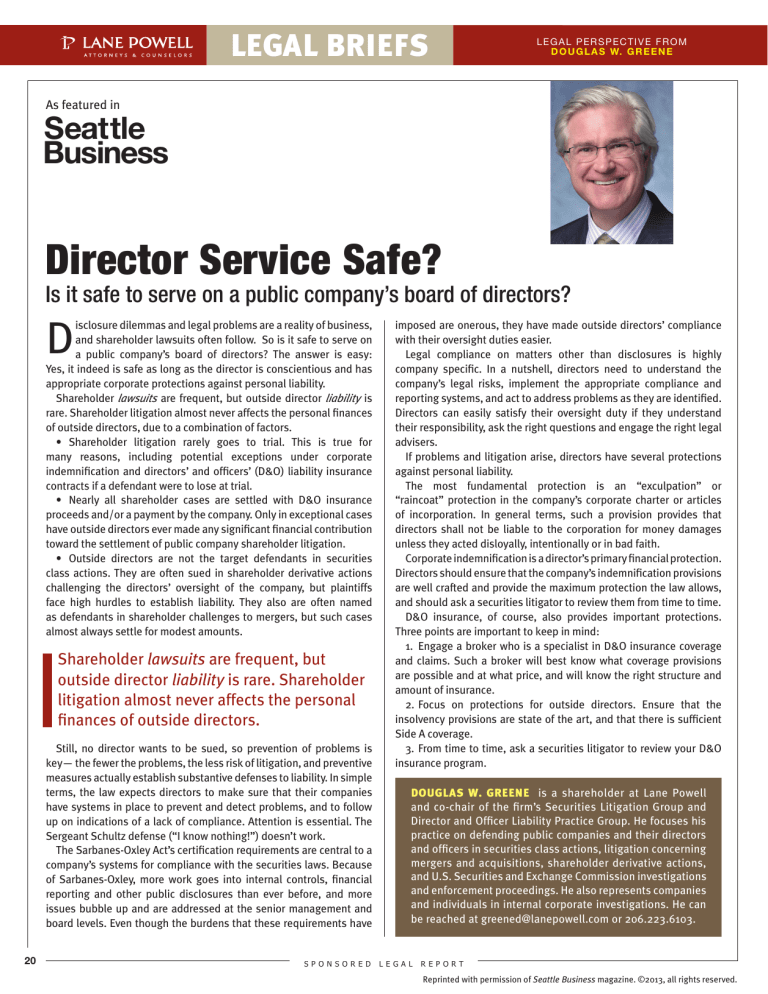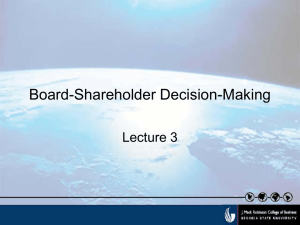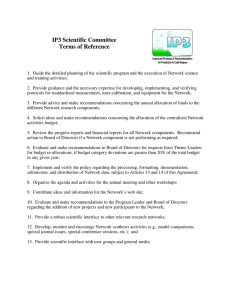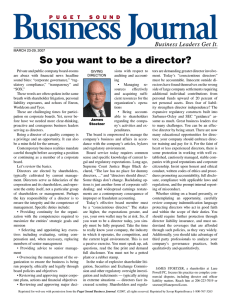D Seattle Business

LEGAL BRIEFS
L E G A L P E R S P E C T I V E F R O M
D O U G L A S W. G R E E N E
As featured in
Business
20
Director Service Safe?
Is it safe to serve on a public company’s board of directors?
D isclosure dilemmas and legal problems are a reality of business, and shareholder lawsuits often follow. So is it safe to serve on a public company’s board of directors? The answer is easy:
Yes, it indeed is safe as long as the director is conscientious and has appropriate corporate protections against personal liability.
Shareholder lawsuits are frequent, but outside director liability is rare. Shareholder litigation almost never affects the personal finances of outside directors, due to a combination of factors.
• Shareholder litigation rarely goes to trial. This is true for many reasons, including potential exceptions under corporate indemnification and directors’ and officers’ (D&O) liability insurance contracts if a defendant were to lose at trial.
• Nearly all shareholder cases are settled with D&O insurance proceeds and/or a payment by the company. Only in exceptional cases have outside directors ever made any significant financial contribution toward the settlement of public company shareholder litigation.
• Outside directors are not the target defendants in securities class actions. They are often sued in shareholder derivative actions challenging the directors’ oversight of the company, but plaintiffs face high hurdles to establish liability. They also are often named as defendants in shareholder challenges to mergers, but such cases almost always settle for modest amounts.
Shareholder lawsuits are frequent, but outside director liability is rare. Shareholder litigation almost never affects the personal finances of outside directors.
imposed are onerous, they have made outside directors’ compliance with their oversight duties easier.
Legal compliance on matters other than disclosures is highly company specific. In a nutshell, directors need to understand the company’s legal risks, implement the appropriate compliance and reporting systems, and act to address problems as they are identified.
Directors can easily satisfy their oversight duty if they understand their responsibility, ask the right questions and engage the right legal advisers.
If problems and litigation arise, directors have several protections against personal liability.
The most fundamental protection is an “exculpation” or
“raincoat” protection in the company’s corporate charter or articles of incorporation. In general terms, such a provision provides that directors shall not be liable to the corporation for money damages unless they acted disloyally, intentionally or in bad faith.
Corporate indemnification is a director’s primary financial protection.
Directors should ensure that the company’s indemnification provisions are well crafted and provide the maximum protection the law allows, and should ask a securities litigator to review them from time to time.
D&O insurance, of course, also provides important protections.
Three points are important to keep in mind:
1. Engage a broker who is a specialist in D&O insurance coverage and claims. Such a broker will best know what coverage provisions are possible and at what price, and will know the right structure and amount of insurance.
2. Focus on protections for outside directors. Ensure that the insolvency provisions are state of the art, and that there is sufficient
Side A coverage.
3. From time to time, ask a securities litigator to review your D&O insurance program.
Still, no director wants to be sued, so prevention of problems is key— the fewer the problems, the less risk of litigation, and preventive measures actually establish substantive defenses to liability. In simple terms, the law expects directors to make sure that their companies have systems in place to prevent and detect problems, and to follow up on indications of a lack of compliance. Attention is essential. The
Sergeant Schultz defense (“I know nothing!”) doesn’t work.
The Sarbanes-Oxley Act’s certification requirements are central to a company’s systems for compliance with the securities laws. Because of Sarbanes-Oxley, more work goes into internal controls, financial reporting and other public disclosures than ever before, and more issues bubble up and are addressed at the senior management and board levels. Even though the burdens that these requirements have
DOUGLAS W. GREENE is a shareholder at Lane Powell and co-chair of the firm’s Securities Litigation Group and
Director and Officer Liability Practice Group. He focuses his practice on defending public companies and their directors and officers in securities class actions, litigation concerning mergers and acquisitions, shareholder derivative actions, and U.S. Securities and Exchange Commission investigations and enforcement proceedings. He also represents companies and individuals in internal corporate investigations. He can be reached at greened@lanepowell.com or 206.223.6103.
S P O N S O R E D L E G A L R E P O R T
Reprinted with permission of Seattle Business magazine. ©2013, all rights reserved.





